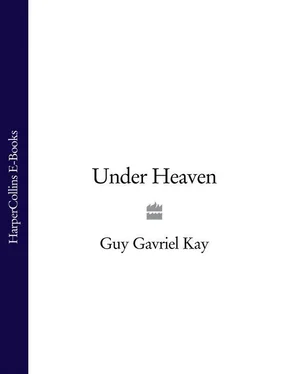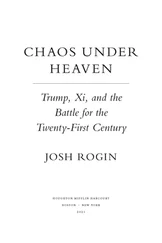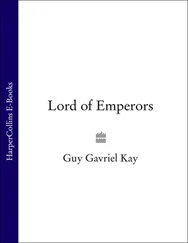After the invocations, which he assumed his brothers were also performing in the home where they’d all been born, Tai would go out into the mountain meadow (shades of green dotted with wildflowers, or crunching underfoot with ice and snow) and—unless there was a storm—he would do his Kanlin exercises. No sword, then one sword, then both.
He would look at the cold waters of the lake, with the small isle in the middle of it, then up at the surrounding, snow-draped, stupefying mountains piled upon each other. Beyond the northern peaks the land sloped downwards for hundreds of li towards the long dunes of the killing deserts, with the Silk Roads running around either side of them, bringing so much wealth to the court, to the empire of Kitai. To his people.
In winter he fed and watered his small, shaggy horse in the shed built against his cabin. When the weather turned and the grass returned, he’d let the horse graze during the day. It was placid, wasn’t about to run away. There was nowhere to run.
After his exercises, he would try to let stillness enter into him, a shedding of the chaos of life, ambition and aspiration: to make himself worthy of this chosen labour.
And then he would set to work burying the dead.
He’d never, from first arrival here, made any effort to separate Kitan from Taguran soldiers. They were tangled together, strewn or piled, skulls and white bones. Flesh gone to earth or to animals and carrion birds long since, or—for those of the most recent campaign—not so very long ago.
It had been a triumph, that last conflict, though bitterly hardwon. Forty thousand dead in one battle, almost as many Kitan as Taguran.
His father had been in that war, a general, honoured afterwards with a proud title, Left Side Commander of the Pacified West. Rewarded handsomely by the Son of Heaven for victory: a personal audience in the Hall of Brilliance in the Ta-Ming Palace when he returned back east, the purple sash presented, words of commendation spoken directly, a jade gift extended from the emperor’s hand, only one intermediary.
His family were undeniably beneficiaries of what had happened by this lake. Tai’s mother and Second Mother had burnt incense together, lit candles of thanksgiving to ancestors and gods.
But for General Shen Gao, the memory of the fighting here had been, until he’d died two years ago, a source of pride and sorrow intermingled, marking him forever after.
Too many men had lost their lives for a lake on the border of nowhere, one that would not, in the event, be held by either empire.
The treaty that had followed—affirmed with elaborate exchanges and rituals and, for the first time, a Kitan princess for the Taguran king—had established as much.
Hearing the number from that battle— forty thousand dead —Tai, when young, had been unable to even picture what it must have been like. That wasn’t the case any more.
The lake and meadow lay between lonely forts, watched by both empires from days away—to the south for Tagur, east for Kitai. It was always silent here now, save for the sound of wind, the crying of birds in season, and the ghosts.
General Shen had spoken of sorrow and guilt only to his younger sons (never to the oldest). Such feelings in a commander could be seen as shameful, even treasonous, a denial of the emperor’s wisdom, ruling with the mandate of heaven, unfailing, unable to fail or his throne and the empire would be at risk.
But the thoughts had been spoken, more than once, after Shen Gao’s retirement to the family property on their south-flowing stream near the Wai River, usually after wine on a quiet day, with leaves or lotus blossoms falling in the water to drift downstream. And the memory of those words was the principal reason his second son was here for the mourning period, instead of at home.
You could argue that the general’s quiet sadness had been wrong, misplaced. That the battle here had been in necessary defence of the empire. It was important to remember that it hadn’t always been the armies of Kitai triumphing over the Tagurans. The kings of Tagur, on their distant, completely defended plateau, were hugely ambitious. Victory and savagery had gone both ways through a hundred and fifty years of fighting by Kuala Nor beyond Iron Gate Pass, which was, in itself, as isolated a fortress as the empire knew.
“A thousand miles of moonlight falling, east of Iron,” Sima Zian, the Banished Immortal, had written. It wasn’t literally true, but anyone who had ever been at Iron Gate Fortress knew what the poet meant.
And Tai was several days’ ride west of the fort, beyond that last outpost of empire, with the dead: with the lost crying at night and the bones of over a hundred thousand soldiers, lying white in falling moonlight or under the sun. Sometimes, in bed in the mountain dark, he would belatedly realize that a voice whose cadences he knew had fallen silent, and he would understand that he’d laid those bones to rest.
There were too many. It was beyond hope to ever finish this: it was a task for gods descending from the nine heavens, not for one man. But if you couldn’t do everything, did that mean you did nothing?
For two years now, Shen Tai had offered what passed for his own answer to that, in memory of his father’s voice asking quietly for another cup of wine, watching large, slow goldfish and drifting flowers in the pond.
The dead were everywhere here, even on the isle. There had been a fort there, a small one, rubble now. He’d tried to imagine the fighting sweeping that way. Boats swiftly built on the pebbled shore with wood from the slopes, the desperate, trapped defenders of one army or the other, depending on the year, firing last arrows at implacable enemies bringing death across the lake to them.
He had chosen to begin there two years ago, rowing the small craft he’d found and repaired; a spring day when the lake mirrored blue heaven and the mountains. The isle was a defined ground, limited, less overwhelming. In the mainland meadow and far into the pine woods the dead lay strewn as far as he could walk in a long day.
For a little more than half the year under this high, fierce sky he was able to dig, bury broken, rusted weapons with the bones. It was brutally hard work. He grew leathery, muscled, callused, ached at night, fell wearily into bed after washing in water warmed at his fire.
From late fall, through the winter, into early spring, the ground was frozen, impossible. You could break your heart trying to dig a grave.
In his first year the lake froze, he could walk across to the isle for a few weeks. The second winter was milder and it did not freeze over. Muffled in furs then, hooded and gloved in a white, hollow stillness, seeing the puffs of his mortal breath, feeling small against the towering, hostile vastness all around, Tai took the boat out on days when waves and weather allowed. He offered the dead to the dark waters with a prayer, that they might not lie lost any longer, unconsecrated, on wind-scoured ground here by Kuala Nor’s cold shore, among the wild animals and far from any home.
WAR HAD NOT BEEN CONTINUOUS. It never was, anywhere, and particularly not in a mountain bowl so remote, so difficult for sustained supply lines from either country, however belligerent or ambitious kings and emperors might be.
As a consequence, there had been cabins built by fishermen or by the herders who grazed sheep and goats in these high meadows, in the intervals when soldiers weren’t dying here. Most of the cabins had been destroyed, a few had not. Tai lived in one of them, set north against a pine-treed slope—shelter from the worst winds. The cabin was almost a hundred years old. He had set about repairing it as best he could when he’d first come: roof, door and window frames, shutters, the stone chimney for the fire.
Читать дальше












